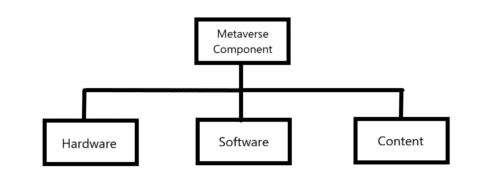Metaverse has made a huge impact on almost every technical as well as non technical industry. The idea of a virtual reality might have started from experiencing a video game but it is not limited to gaming and media. Branding and marketing, for example, is being digitally tailored as it exhibits an impression on a large number of people. Metaverse technologies promise the next level of interaction in the virtual and physical worlds, providing innovative new opportunities and business models.
Glance At Metaverse
Metaverse is a combination of various components which deals with devices in the form of virtual reality. Professionals think of metaverse as the next iteration of the internet, where your digital copy or “Digital Twin” can explore the virtual world. A metaverse is not device-independent, nor owned by a single vendor. It is an independent virtual economy, enabled by digital currencies and non-fungible tokens (NFTs). As a combinatorial innovation, metaverses require multiple technologies and trends to function. Contributing trends include virtual reality (VR), augmented reality (AR), flexible work styles, head-mounted displays (HMDs), an AR cloud, the Internet of Things (IoT), 5G, artificial intelligence (AI) and spatial computing.
These contributing trends are categorized into three groups : Hardware, Software, and Content.

Hardware consists of the head mount devices which include certain kinds of sensors, certain motion devices along with a software which renders the content in the form of audio, video and text.The content would be stories, scenarios and even shopping.
What’s the hype around the metaverse?
There’s a lot of excitement and even opportunities around metaverse, driven by technology companies claiming to create or enhance metaverse to enhance or augment the digital and physical realities of people.
Metaverse is a growing business and the pros believe that it will provide business models that will enable organizations to extend digital business. Experts foresee emerging opportunities, for example :
- J.P. Morgan predicts a market opportunity of $1 trillion, eyeing virtual real estate and has become the first bank to establish a presence in the metaverse.
- by 2024 the metaverse market size will be over 800 billion dollars with an expected growth of 13.1% every year.
- 25% of the global population will spend nothing less than one hour of their day on metaverse.
- 76 million AR/VR Global shipments by 2025.
“When it comes to security and privacy, metaverse framework offers high-end security with its blockchain based IoT framework with machine learning which processes real-time data along with ML model to deliver application specific access to users.”
Exploring business opportunities in Metaverse
Metaverse being a virtual “world” offers almost every other business opportunity similar to the physical world. Metaverse applications include shopping, meetings, gatherings, digital events, virtual schooling, healthcare, tourism, smart manufacturing, recruitment and training and much more. Currently entertainment and gaming has entered the market like bloktopia and roblox. Social interactions are also a part of it like hyperverse and other platforms based on their applications. These concepts come together in a single space application i.e. smart city where multiple business models can be implemented and utilized at its best.
A recent addition to this list is the concept of “Digital Twin.” Digital twin is basically a type of digital environment where the physical user has been created in a digital world which allows surgeons and health professionals to practice procedures on simulated versions of the user or patient. Doctors can analyze the data input from the patient and then based on that the system that consists of a machine learning algorithm and an in-built repository and database of similar patients, develop a digital twin of the patient. This all is done by an AI that understands and analyzes the patient based on the input data. This makes it easier for the doctor to make a decision.
A similar example is banking which can enrich smart cities in metaverse space. J.P.Morgan has come up with the metaverse idea where some banking customer visits various facilities and they offer various services. Another banking example is South Korea’s KB Bank where users can come and virtually experience their facilities. They have unveiled a bank testbed allowing customers wearing a head-mounted VR device to access banking service in a metaverse. An employee avatar helps clients analyze risk-return profiles or design investment portfolios. They can also browse for personalized financial information in the hall. The client calls and visits all the virtual branches.

Entertainment has already entered the virtual space where influencers and artists walk up the stage, presenting their new albums and art. Daler Mehndi has bought Balle Balle Land in Metaverse and has become the first Indian to acquire land in metaverse. If you see a video he takes a tour into his land and even sings a song. So the metaverse again on the entertainment side is bringing different experiences for the world.
This set of applications and a wide open door of opportunity into a world that can be programmed as per one’s desire is nothing less than a break into a digital multiverse. Nevertheless, the financial and reputational risks of early investments aren’t fully known. Exploring opportunities where metaverse technologies could optimize digital business and investing in specific emergent metaverses cautiously and protect your reputation by proactively establishing a data governance, security and privacy policy to protect customer and employee data should help begin the roadmap into the world of virtual.
This article is based on a talk session delivered at India Electronics Week (IEW) 2022 by Dr S. Kumar, Head of AI, Samsung.






